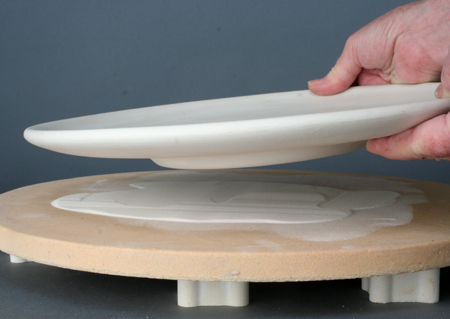 |
|
|
Kiln Pointers
|
|
|
Protecting Heating Elements from Contamination |
CONTENTS Protecting Heating Elements from Contamination Recent Q&As: Converting a 240 volt kiln to 120 volt; an ohmmeter pointer A Kiln Story: The Silly Mistake Memorable Quote News: Paragon Raises Knifemaking Furnace Temperature Ratings ----------- PROTECTING HEATING ELEMENTS FROM CONTAMINATION Heating elements can burn out from contact with materials such as ceramic glaze, glass particles, kiln wash, and glass separator. Please follow these guidelines to protect your elements from contact with foreign materials: 1) Some people brush kiln wash from the bottom of ware as they unload the kiln. This can burn out an element if you do this while standing over the kiln, because kiln wash or glass separator particles can fall into the element grooves. Stand away from the kiln when you brush kiln wash from the ware. 2) Some ceramic glazes spatter during firing. If possible, keep glazed ware 1-1/2” to 2” away from the element grooves. 3) Kiln coating, which is similar to kiln cement, can be coated onto the firebrick lid or roof to seal the firebrick pores. Kiln coating looks like kiln wash, though, so be careful to label kiln coating and kiln wash properly. Kiln wash mistakenly applied to the lid can flake off and work its way into an element groove. Coat the kiln’s firebrick floor with kiln wash, but avoid splashing the kiln wash onto the kiln walls. 4) While replacing elements, prevent the new elements from touching the floor, the bottom of the kiln, or anything that could contaminate it. It is okay to handle elements with your bare hands, though. Oil from the skin will burn off harmlessly during firing. 5) Before threading a new element into the element groove, check for groove contamination. This is a dark spot left over from where the previous element burned out. Use a dental mirror to inspect the grooves. Dig contamination out of the groove with a screwdriver or a curved dental tool. 6) Occasionally inspect the walls of your kiln. Remove embedded glaze and glass, which can remelt during the next firing and run into an element groove. ----------- RECENT Q&As Q. I have an old manual 240 volt kiln. Can I convert it to 120 volts? A. Certain models of jewelry kilns can be converted from 240 volt to 120 and vice versa. An example is the Paragon SC-2. As a 120 volt kiln, the two elements are wired in parallel. As a 240 volt kiln, they are wired in series. However, larger 240 volt kilns cannot be converted, because on 120 volts, the kiln would not have adequate power. Q. How does one test the elements? I am concerned that mine are worn out. A. You can test the elements with an ohmmeter. However, it can be difficult to tell from an ohmmeter reading if the elements are worn out, because the meter could be a little out of calibration. A more reliable way to test them is the voltage-under-load and ammeter tests. Compare the amperage reading with the amps listed on the kiln’s electrical data plate. Here is a video that shows how to do the tests: http://www.youtube.com/watch?v=UsDdQaIO7FI ----------- A KILN STORY: THE SILLY MISTAKE I laughed at this story, because it describes the type of mistake that anyone could make. We are often much harder on ourselves than we are on others: Pattie Necaise of Ocean Springs, Mississippi wrote, “Working at a new craft store, I fired the kiln for the first time. It seemed to take forever. The owner of the shop was waiting for it to cut off so we could lock up the shop and leave. “Checking the kiln one more time,” Pattie wrote, “I noticed that I hadn't turned the manual switches up to high. After I flipped the knobs to high, the kiln fired out in a short time. We turned everything off and locked up. The load fired out just fine. I never got the nerve to tell the owner it was a stupid mistake of mine. She told me she hoped the kiln wouldn't take so long to fire next time and I told her I was sure it wouldn't. Only I know it was my silly mistake, but I never made that mistake again.” Feel free to send your kiln stories to the email address below. ----------- MEMORABLE QUOTE “If you're interested in balancing work and pleasure, stop trying to balance them. Instead, make your work more pleasurable.” --Donald Trump ----------- NEWS: PARAGON RAISES KNIFEMAKING FURNACE TEMPERATURE RATINGS We have just raised the maximum temperature rating of our KM-series knifemaking furnaces from 2000 F (1093 C) to 2350 F (1287 C). ----------- Not long ago I finished reading William Manchester’s “The Last Lion,” Volume II, an absorbing biography of Winston Churchill. During the late 1930s, Churchill, though a member of Parliament, couldn’t concentrate fully on world events, because he had to earn extra income by writing magazine articles. Sometimes the mundane gets in the way of our greatest aspirations. The next time you wish you had more time to create pottery, fuse glass, or make silver jewelry, remember that even Winston Churchill, one of the greatest statesmen of his time, had to deal with the mundane, too. Thank you, With best wishes, Arnold Howard Paragon Industries, L.P. – Better Designed Kilns 2011 South Town East Blvd., Mesquite, Texas 75149-1122 Voice: 972-288-7557 & 800-876-4328 / Fax: 972-222-0646 / ahoward@paragonweb.com / www.paragonweb.com / www.facebook.com/paragonkilns PRIVACY NOTICE: Under no circumstance do we share or sell your email address. Copyright 2011, by Paragon Industries, L.P. |
|
|

|
|
|
|
|
“Custom and standard Kilns and Industrial Furnaces for ceramics, pottery, heat treating, enameling, |
||||
